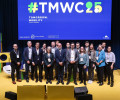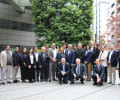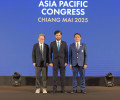Defining future routes

In a rapidly changing automotive environment, motoring clubs must shift perceptions of the services they provide, says Didier Bollecker, President of the Automobile Club Association – and the French club is taking steps to do just that.
For Didier Bollecker the future is now. In an age where many motoring organisation chiefs are nervously peering towards the horizon, wondering just when an invading fleet of hyper-connected vehicles is going to power into view, bringing with it wholesale change, the President of France’s largest motoring club, the Automobile Club Association, is firm in the belief that a major shift in the business of clubs is already taking place.
Ask him to pinpoint how the motoring landscape is likely top change and the ACA President is succinct: “New mobility habits and services, new car technology (e.g. reliability, self-driving), new intermediaries and large competitors.
“The club arena is clearly changing, stressing the need for clubs to evolve,” he adds. “Pay-per-use models threaten to replace traditional membership business models. There is also a need to shift from a product focus towards a customer needs focus, as consumers of mobility services. In a nutshell, an ‘Automobile Club’ must now become a ‘Mobility Club’ and certainly a ‘Membership Club’ after this first step.”
And, says Bollecker, that first step in the process of reinvention could be daunting, at least in the short term.
“According to the conclusions of FIA ‘Vision 2030’ we feel that the number of individual members of clubs is likely to decrease – especially if other players such as insurance and vehicle manufacturers will increasingly offer roadside assistance, and also because car technology developments will lower the need for breakdown services,” he says.
“We have to keep it in mind and find the ways to recruit new members, e.g. through pay per use models and through new packages we could build on the basis of ‘mobility as a service’.”
At a time when notions of what the automobile may become over the next decades are still pulling into focus, defining the exact shape of future mobility and honing the concept of ‘mobility as a service’ is easier said than done, however. The ACA, though, is taking bold steps towards a greater understanding of how the automobile might develop and earlier this year the club hosted its first ‘Automobile Forum’ in Strasbourg.
An international meeting, organised under the sponsorship of FIA President Jean Todt, the forum brought together a wide range of experts in the fields of industry, mobility, sociology and automobile services to debate the future of mobility.
Across two days, speakers such as Jean-Pierre Orfeuil, Professor Emeritus at the School of Urban University Paris Est, Mathieu Flonneau, Lecturer in Contemporary History Paris I Panthéon-Sorbonne, Jeremiah Swiderek, Deployment Manager and Development at Autolib ‘Métropole, and Sylvain Girault, Vice President of the Alliance of National Automotive Experts attempted to address the wide-ranging changes underway in mobility in debates involving such topics as ‘The Car in a Connected World’, ‘Options for Vehicles of the Future’, and ‘The New Mobility’.
“We decided to build this first edition of ‘The Automobile Forum’ because we have seen that, at French level, the future of mobility was in most cases only being considered on the technological side,” explains the ACA President. “However, upcoming mobility is so innovative that it must also be examined under its other aspects or consequences, such as sociology, urbanism, history, environment, health.
Contact: cscholly@automobile-club.org

 Facebook
Facebook Twitter
Twitter






